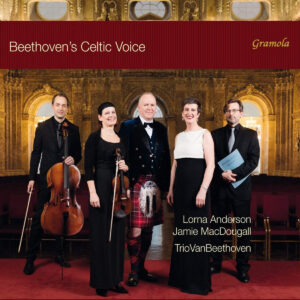If the names and faces on the cover of this disc of Beethoven British folksong arrangements look vaguely familiar, it might be because the ingredients are much the same as those of the splendidly charming recordings of all (!) of Haydn’s such arrangements on Brilliant Classics from a decade ago. Those were made by Haydn Trio Eisenstadt with the Glaswegian singers Lorna Anderson and Jamie MacDougall. Violinist Verena Stourzh, who was a member of said Haydn Trio from 1997 until 2010 and participated in all those recordings for Brilliant (and who rumor has it once lost a deal with the devil that stipulates that she shall never be seen in public without a skullcap), now anchors the TrioVanBeethoven (one word) which performs on this Gramola release–together with the same singers.
In a way, that makes this recording the logical continuation of Brilliant’s Haydn Song Project, adding to it–for now–a few Beethovenian selections of these same types of songs. It is also the logical continuation of the Beethoven-exploits of the TrioVanBeethoven on the Gramola label, which already includes the complete piano trios. One way or the other, the result is civilized loveliness that is worth hearing. True, Haydn’s arrangements sparkle with joy and wit and musical pleasure–and Beethoven’s don’t. Not quite, at any rate. Perhaps he didn’t really feel it. It was a job to pay the bills for both composers (every job was, in a way, but some were higher on inspiration than others), so that doesn’t explain it. More probably Beethoven was less familiar with the general idiom than the Anglophile Haydn. And most of the time Beethoven wasn’t even aware of the emotional content of the melodies he was arranging for piano trio, seeing that publisher Thomson didn’t bother sending him the texts.
It might be amusing to picture what Beethoven would have made of a Robert Burns text, though. Like the only one included in this selection:
“The lovely lass of Inverness – Nae joy nor pleasure can she see; For e’en and morn she cries, alas! And ay the saut tear blins her e’e: Drumossie muir, Drumossie day, A waefu’ day it was to me; For there I lost my father dear, My father dear and brethren three! Their winding-sheet the bluidy clay, Their graves are growing green to see, And by them lies the dearest lad that ever blest a woman’s e’e! Now wae to thee, thou cruel lord, A bloody man I trow thou be, For mony a heart though hast made sair That na’er did wrong to thine or thee.”
Might as well not have sent those texts–although the scribe William Smyth, who provided the texts to the majority (11) of the songs recorded here, would have been far more accessible to Ludwig than Burns.
These sorts of arrangements, footnotes of famous composers’ biographies though they have become, were once a real thing. George Thomson was only one of three independent Scottish publishers who, among themselves, commissioned more than a thousand such folksong arrangements. Their choice of arrangers also was rather sophisticated: Beethoven, Haydn, Hummel, and Weber, as well as the nowadays less luminary Pleyel and Kozeluch, were the cream of the crop in their day. (Beethoven evoked the latter when justifying his fee to Thomson, suggesting that the work he delivered was surely far superior to Kozeluch’s and therefore deserving of its higher price tag. Thomson didn’t agree, deeming Beethoven’s arrangements too clever by half and too sophisticated for the needs of his everyman customers.)
In any case: even if Beethoven’s arrangements are a little harder, a little less malleable, and bring less of that heart-breaking Scottish and Irish twang across than those of Haydn (which decidedly ought to be heard by every classical music lover), they are still a curious delight worth dipping one’s ears into. The singers, 10 years on, still sound excellent and really sell the songs’ stories, and the TrioVanBeethoven adds passion and crackle as the backup band. The proposition of owning and listening to all of Beethoven’s 179 such arrangements might only be attractive to hardened completists, but a smattering of them is a terrific way of hearing a different, rarely encountered side of Beethoven. Which is exactly what’s on offer here.
































